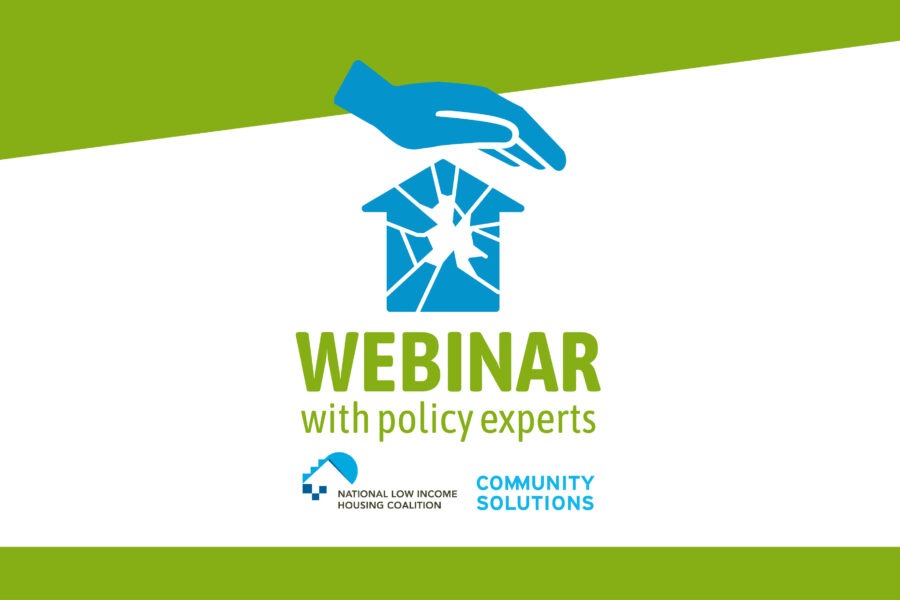On December 16, Community Solutions and the National Low Income Housing Coalition (NLIHC) hosted a panel of experts who explored the negative impact of evictions on communities during the pandemic and how communities can help prevent them. Attendees included leaders from our Built for Zero communities and housing justice advocates from across the country.
Moderated by Amber Elliott, a Community Based Improvement Advisor with Community Solutions, this webinar took place against the backdrop of a looming eviction crisis. With the expiration of the CDC eviction moratorium on Dec. 31, 40 million people could lose eviction protection, and possibly their homes. This will not only lead to increases in homelessness but could also lead to increases in COVID cases and deaths.
“The housing market is rooted in commodity and the production of profit. Housing needs to be seen as fundamental to a healthy society,“ Marc Dones, the Executive Director of the National Innovation Service, said as they kicked off the webinar, encouraging the attendees to shift their thinking about how we view housing and homelessness. Highlighting the urgency of the moment and its impact on communities of color, Dones set the tone for the conversation by highlighting the impact of racism on our housing system.
Dones referenced the Framework for an Equitable COVID-19 Homelessness Response, which helps communities prioritize how best to use CARES Act funding using an equitable lens. They noted that the framework explicitly does not prioritize eviction prevention, because evictions have a disproportionate impact on certain communities and the funding cannot be targeted toward specific groups. And they reminded us that this current housing crisis is happening within an inequitable housing system. They ended their remarks by reminding us that housing justice is tied to health justice, criminal justice, and racial justice.
Focusing on the current acute eviction crisis, Emily Benfer, professor at Wake Forest Law School, reviewed data and research showing that the greatest impact of evictions is hitting our most vulnerable communities the hardest.
She reminded us that the U.S. entered this pandemic in the middle of a severe affordable housing crisis, with about 21% of the population already rent-burdened, which means they spend over 30% of their income on housing costs. Reviewing state and local actions, she demonstrated that eviction moratoria do work to keep people stably-housed and, in turn, reduce the spread and mortality rates of COVID-19. She shared research showing that cities and states that halted evictions slowed the spread of the transmission of COVID. And with the expiration of the CDC eviction moratorium on Dec. 31, 40 million people could lose this protection, and possibly their homes. This will not only lead to increases in homelessness but could also lead to increases in COVID cases and deaths.
Under the CDC eviction moratorium, which started Sept. 4, renters can apply for eviction protection by submitting a form to their landlord. The eligibility criteria includes: renters who make less than $99,000 a year (or twice that for those who file jointly) and can demonstrate they lost their job, can’t pay their rent due to the pandemic, and don’t have alternate housing arrangements.
Rebecca Yae, NLIHC Senior Research Analyst, highlighted the need for extending the eviction moratorium and securing federal resources dedicated to rental assistance. Without rental assistance, millions of renters could face eviction after the moratorium expires.
Few programs currently provide rental assistance and need dramatically outpaces the funding available for the programs that do exist. Three-quarters of rental assistance programs are using CARES Act funds and most programs provide short-term relief — just three months or less.
Over the past eight months, Vincent Reina, Assistant Professor, University of Pennsylvania, has been working with local governments to help them develop their rental relief and assistance programs and evaluating these programs, particularly for their impact on families. Based on this research, he found that there was great variability in the design of the programs, including their goals, local capacity, the existing housing resources, and ability to be flexible. And each of these variables impacted the communities’ ability to quickly and efficiently provide rental assistance to those in need.
Providing the perspective of a local government, Lulu Mickelson, program director at the Los Angeles mayor’s office, shared how LA designed and implemented their eviction prevention efforts.
“Before the pandemic, more than 600,000 households in LA County were spending more than 90% of household income on rent,” she said. This set the stage for the deleterious effects of the pandemic and the subsequent economic fallout.
To help keep Angelenos housed, the LA’s program had three main pillars: emergency tenant protections, emergency rental assistance, and eviction freedom program. Through the emergency rental assistance program, the City of Los Angeles provided over 50,000 low-income renter households with a one-time $2,000 rent subsidy using CARES Act Coronavirus Relief Funds. This involved an extensive outreach and engagement program, the ability to be flexible and nimble, and evaluating their success along the way.
Marc Dones, the Executive Director of the National Innovation Service
Marc Dones (they/them/theirs) is a social entrepreneur, policy strategist, and social justice activist with 10+ years of experience in equitable systems transformation across local, state, and federal governmental systems. Prior to launching NIS, Marc held various roles in social impact, specializing in policy, program design, and continuous improvement.
Emily Benfer, Professor, Wake Forest Law School, Founding Director of the Wake Forest Law Health Justice Clinic
Emily Benfer (she/her/hers) is a visiting professor of law and the founding director of the Health Justice Clinic at Wake Forest School of Law. Her clinic practice and research focus on the intersection of social determinants of health, racial inequity, and poverty with an emphasis on housing, as well as community-based and interdisciplinary approaches to access to justice and health equity. Professor Benfer has widely published, testified before Congress and appeared in numerous media outlets on these topics.
Rebecca Yae, NLIHC Senior Research Analyst
Rebecca Yae (pronounced like yay) (she/her) is a senior research analyst at the National Low Income Housing Coalition; her research focuses on tracking the implementation and effectiveness of state and local emergency rental assistance programs created or expanded in response to COVID-19.
Vincent Reina, Assistant Professor, University of Pennsylvania
Vincent Reina is an Assistant Professor in the Department of City and Regional Planning at the University of Pennsylvania. His research focuses on urban economics, low-income housing policy, household mobility, neighborhood change, and community and economic development. Reina’s work has been published in various academic journals, such as Urban Studies, Housing Policy Debate, and Journal of Housing Economics. In 2017 he helped the City of Philadelphia develop its framework and strategy for preserving its stock of existing subsidized housing, and in 2018 worked with the City of Philadelphia to write its first citywide housing plan.
Lulu Mickelson, Program Director, City of Los Angeles, Office of Mayor Eric Garcetti
Lulu Mickelson (she/her) is a public servant committed to building more just and inclusive cities. As the Director of Housing Security Initiatives for the Los Angeles Mayor’s Office, Lulu works across teams to promote policy interventions that keep Angelenos securely housed, including coordinating the city’s immediate COVID-19 response for vulnerable tenant households.




